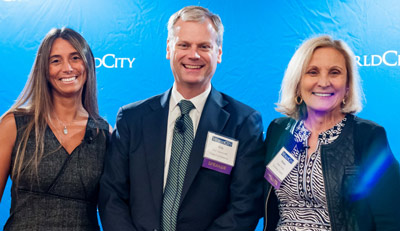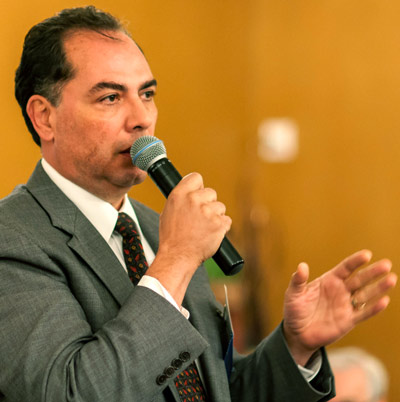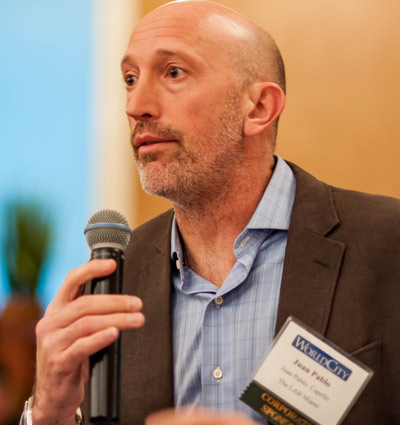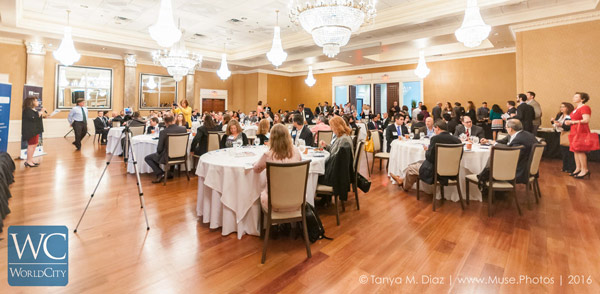The big, uncertain picture: 2017 Global Economic Outlook
If one word could describe the world outlook for 2017, it’s uncertainty.
 That was the take-away from the Big Picture panel at WorldCity’s largest Global Connections event held Jan. 27, 2017 and headlined by Donna Hrinak, president of Boeing Latin America and the Caribbean; Eric Farnsworth, vice president the Council of the Americas; and Magdalena Ramada, senior economist at Towers Watson.
That was the take-away from the Big Picture panel at WorldCity’s largest Global Connections event held Jan. 27, 2017 and headlined by Donna Hrinak, president of Boeing Latin America and the Caribbean; Eric Farnsworth, vice president the Council of the Americas; and Magdalena Ramada, senior economist at Towers Watson.
“We’re just not sure what’s going to happen, and in particular, we’re just not sure what’s going to happen in D.C. and in this country,” said Hrinak. Her feelings were shared among the sold-old crowd. When asked to choose between” anxious” or “optimistic” for the short term, a majority of people raised their hands for “anxious.”
Risks from social instability and inequality
For economist Ramada, the anxiety stems from “profound social instability we’re seeing in most democracies.” Fed by inequality and polarization, “societal risks are on the rise, and that’s not for emerging markets anymore,” she said. “Now, all the questions I get are for developed markets.”
Yet all three panelists are hopeful too. Ramada sees promise for tech innovation, including cybersecurity and artificial intelligence. She and Farnsworth are heartened by economic progress in Latin America and its middle class that mushroomed in the past decade. And Hrinak is buoyed by continuing growth in commercial aviation around the globe.
But they’re concerned about the effects of a Trump administration, especially in the nearby Latin American region.
“2018 is going to be a huge round of elections across the region,” said Farnsworth, pointing to voting next year in Venezuela, Brazil, Colombia, Mexico and other nations. “Depending on the direction Washington takes on the economic side, that could very directly impact the region,” he said, “bringing to power some folks who may not be a part of the establishment.”
Latin America generally would like to expand business with the United States, but Trump may not be so keen.
“This would be irony,” said Farnsworth. “Because at a time when many in Latin America are looking for a close relationship with the United States, particularly on trade and investment, the United States seems to be…going the other direction, not wanting to engage in that way with the region.”
Amid the uncertainty, many multinational companies are sitting tight and watching.
“It’s a wait and see game,” said Ramada. “A lot of long term and strategic decisions are being delayed…This is for every company at every level in every region of the world.”
” You want optimistic things?,” asked Ramada. “I think 2018 will get us out of that state of lethargy.”
China’s ambition in Latin America
If Trump opts to work less in Latin America, China could pick up the slack, Farnsworth said. The Asian superpower has become active in Latin America in the past 15 years and helped keep the region out of recession in 2008-2009.
“What is China’s ambition in the Western Hemisphere?,” asked Farnsworth. “Look, China has 1.4 billion people that they need to feed…How do you supercharge your economy? You bring in as many commodities as possible from abroad.”
Unlike the United States, China’s “policies in the public and the private sector are highly aligned,” added Ramada. “Asian multinationals and Chinese multinationals are investing heavily in Latin America and in Africa and in Southeast Asia,” said Ramada, even noting a big Chinese investment in the Brickell area of Miami. That alignment provides long-term stability, “which is not the case with most multinationals of the Western world.”
Concerns over cybersecurity, climate change
Besides social instability, Ramada sees two other important sources of risk: cybersecurity and the environment. While there are new tools to mitigate risks on computers, the corporate community is not doing enough to keep governments accountable on cybersecurity, said Ramada.
An audience member asked panelists how companies should react to consumer demands for environmental protections if the U.S. government backs out of climate-change agreements.
“A lot is being done to build resilience,” Ramada told the crowd.“We’re trying to work on the mitigation side of the effects of that, more than actually eradicating the causes. Eradicating the causes is something that can only be done if there is an international will in a consolidated and unified way. I don’t see that happening sadly.”
The importance of collaboration worldwide
Boeing, however, does sees reasons for optimism on climate change in aviation.
“The airlines have set some very ambitious targets for reducing greenhouse gas emissions,” said Hrinak. “Freezing the growth in emissions by 2020, and then reducing by 50 percent the greenhouse gas emissions by the year 2050, …with 2005 as a baseline. It’s going to be very difficult to reach these targets unless the entire industry works together.”
That collaboration may well prove vital for groups across the world to reduce uncertainties this year.
Global Connections is one of four event series organized by media company WorldCity to bring together executives in greater Miami on international business topics. WorldCity will launch its 2017 “Who’s Here” directory of multinationals in South Florida on Feb. 24, 2017.


